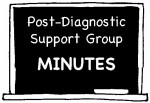 Minutes of the Twenty Sixth
Minutes of the Twenty Sixth
Post-Diagnostic Support Group
13th December 2017
The meeting was very well attended with 46 delegates & a very lovely “Therapy dog”.
Minutes taken by Linda Saint
Speakers – Sarah Hendrix & James Holden
Employment and Sustainability
Sarah Hendrix is a consultant, trainer and author who specialises in giving help to people with ASD particularly in the work place environment. Sarah is also able to benefit the employer in giving advice and enabling them were possible to make adjustments. A person with ASD can make a marvellous employee if there is identification and an understanding of any particular needs.
Sarah’s presentation identified many of the problems ASD sufferers have in coping with the work place being, the social side to work “understanding banter”, the politics of work/organisation, and the ability to cope with change. How a change of environment can be so stressful to someone. This could be the movement of a desk, different noise levels, and different personnel.
How we give instructions to the Autistic individual is crucial. An autistic person given complete clear instructions will be brilliant at completing the task but not perhaps the social norms, a canteen at lunchtime could be a nightmare.
The Autistic person may not be able to understand or be able to resolve conflict.
Problems can also arise when the job role is changed and the ASD person has different expectations to deal with. This could involve a change of location, management, a promotion or the organisational structure is being changed.
Like any one else the stressors that affect the working life of the Autistic individual could be external being family issues or money problems, which affect their functioning.
If the differences of the Autistic individual are not identified and their needs are not met it can lead to significant stress and a detrimental effect on their health.
Various delegates spoke of their problems at work that left them feeling very stressed and in the main they were given little help or support to over come such issues. In variably it led to them having to leave the employment.
What was very clear in what Sarah said is support from HR or a mediation service is vital for the ASD person within the work place. This facility will obviously depend on the size of the organisation.
- How do you find a role and employment that meets your needs? What do you look for? Sarah spoke about the following criteria when looking for employment:
- Location – is it easy to get there, Can I manage the journey, travelling time.
- Interest/skills – do I have the skills does this role interest me?
- People – what do I know about the people? Do I know any one there?
- Environment – Is it a nice place to work? Would I be comfortable there?
- Values – Is the organisation compatible with my views
- Hours – can I manage to work the hours needed? Or would part time working be better, or could I work from home.
- Tasks – is it repetitive tasks or varied?
- Support – What would you need to ask for?
This is a very hard area as the Autistic individual can be penalised in interview situations, as they are sometimes unable to pick up on non-verbal clues or hidden agendas.
JAMES HOLDEN PROJECT MANAGER
Tel 0151 356 6352 or LSES@CHESHIREWEST&CHESTER.GOV.UK
James Holden is responsible for running a pilot for the next 18 months. It has been developed to be run as a pilot by 9 local authorities if successful it will be “rolled out” countrywide. The results will be audited. The pilot project is the initiative of the DWP to enable people with ASD to gain sustainable employment. The sustainability of employment is a huge problem to individuals with Autism Spectrum Disorder. If successful this pilot should provide support to the ASD employee and employers. The pilot will consider people who have an ASD diagnosis coupled with either a social services referral/assessment, or they are on ESA or Universal credit. Please contact James directly for full clarification
The project will provide pre employment support that will look for suitable roles by the use of job analysis. The job analysis will look at any training needs and transport issues. Once the person has been placed in a role there will be on going support to try to identify and sort problems, providing support and guidance for the employee and employer. This gives much hope that a mechanism will be in place to provide much needed sustainable employment.
For those who still wish to evaluate the group support sessions. The questions to consider and then answer are as follows:
- How many group sessions have you attended?
- What do you find most useful or enjoyable about the group?
- How has attending the group benefitted you/your life?
- What would you like to be different about the group? (if anything)
You can CLICK HERE to open an email which contains the questions above which will be sent to Carly, or bring them along on a sheet of paper to the next group.
Responses can be brief – one or two points per question is fine.
Please feel free to respond even if you did not attend the group on 13th December, but have previously.
Our next monthly post-diagnostic support group will take place on:
Wednesday 31 January 2018 between 11.30am and 1.30pm at the Lifestyle Centre, Crewe.
Share This Post:








Leave a Reply